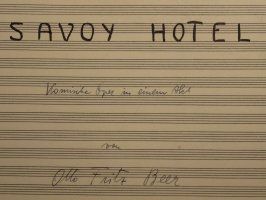Otto Fritz Beer
Otto Fritz Beer was born on 8 September 1910 in Vienna (Austria). His father was the composer Leopold Beer and so an musical education from an early age was natural. After his school days Otto Fritz Beer first studied music at the conservatory in Vienna and later switched to German philology at the university. In 1932 he finished his studies with a thesis on the Singspiele of Mozart.
After his studies Otto Fritz Beer worked as a journalist, critic and editor for different newspapers. First in Vienna, then as editor-in-chief at the "Salzburger Nachrichten", as theatre critic at the "Welt am Abend" in Vienna and editor-in-chief for the arts section of the "Standpunkt" in Meran. He returned to Vienna in 1952 and fulfilled the same position at the "Neues Österreich" until 1967. He then worked as a music and theatre critic for the German newspapers "Die Zeit" and "Süddeutsche Zeitung" and the ORF.
Beside his journalistic work Otto Fritz Beer was also author of different novels. His best known works are "Ich, Roldolfo, Magier", "Der Fenstergucker", "Stadttheater" or "Zehnte Symphonie". An early novel is also "Hotel Zugvogel" from 1948.
Otto Fritz Beer died on 22 April 2002 in Vienna (Austria).
In my possession are two autograph music manuscripts of Otto Fritz Beer. The two large compositions are a "Divertimento for string quartet and orchestra" and the opera comique in one act "Savoy Hotel".
Although Otto Fritz Beer originated from a composing father and studied music at the conservatory there is not a single known music composition by Otto Fritz Beer! The archive of his personal documents is preserved at the Austrian National Library and only contains documents referring to his literary works and his writings on music.
opera comique "Savoy Hotel"
The manuscript to the opera comique "Savoy Hotel" is a full score, containing 211 pages. The works is not signed or dated, but one can see from the title page the identical writing of the composer's name like in his passport photo at the top. The score is written on music manuscript paper from the company of Josef Eberle marked "J.E. & Co. / Protokoll Schutzmarke / No. 14 / 24 linig".
The opera uses full symphony orchestra and the following singing roles:
- Hofrat, Leiter der Kriminalpolizei (court counsellor, head of C.I.D) - bass
- Kitty, seine Freundin (Kitty, his girlfriend) - lyric coloratura soprano
- Schleinicke, Subalternbeamter (Schleinicke, subaltern official) - baritone
- Pigg, Hochstapler (Pigg, impostor) - tenor
- Pogg, Hochstapler (Pogg, impostor) - lyric baritone
- Vier Gäste (Four guests) - men quartet
- Ein Beamter (an official)
- Portier (concierge)
The opera was most likely composed around 1940. This conclusion derives from the facts that the opera is located in present times and the used currency is "Mark". For an Austrian like Otto Fritz Beer there was only the short period of time between 1938 and 1945 when "Mark" was a valid currency: From the annexation by Nazi Germany till the end of World War II.
Due to the enormous historical value of the composition and the fact that there is no other copy of the work, I present here the score and the libretto for information purposes:
Divertimento for string quartet and orchestra
The manuscript for the Divertimento for string quartet and orchestra is also a full score, containing 87 pages. The works is scored for a solo string quartet with an symphony orchestra omitting the violins, viola and violoncello from the string section. Again the work is not signed nor dated, but the handwriting is identical to the one in "Hotel Savoy".
It seems likely that the work was composed during the time of the musical studies of Otto Fritz Beer, because later he completely focussed on writing. That would point to a composition date in the early 1930s.
The work is written on music manuscript paper by the Viennese company of Josef Eberle marked "J.E. & Co / Protokoll Schutzmarke/ No. 12a / 20 linig". That would fit to the assumed composition date, because this kind of manuscript paper was widely used by German-speaking composers in the early 20th century.
An interesting information is the fact that the manuscript was first bound into a brown cardboard, carrying the handwritten title "Divertimento / by / Musicus 41.266". Later the score was wrapped into a paper cover giving the title "Divertimento / von / Otto Fritz Beer". A possible explanation for this could be that Otto Fritz Beer submitted his composition to a competition where it was necessary to make the author anonymous.
Due to the enormous historical value of the composition and the fact that there is no other copy of the work, I present here the score for information purposes:

